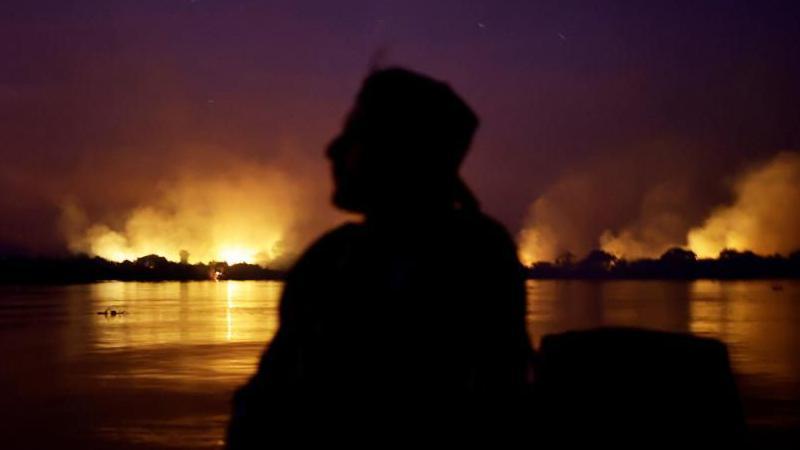Wildfires threaten unique Brazil ecosystem

The wetlands are home to a wide variety of flora and fauna
- Published
Firefighters are battling wildfires in Brazil's Pantanal, the world's largest tropical wetland.
The Pantanal is home to jaguars, giant anteaters and giant river otters.
Close to 32,000 hectares have already been destroyed by the fires in the state of Mato Grosso do Sul, local media report.
Climate experts say this year's wildfire season has started earlier and is more intense than in previous years.
Firefighters said their efforts to extinguish the flames were being hampered by high winds over the weekend.
The region has also seen less rain than in other years, which has made it easier for the fires to spread.
The number of fires from the start of the year up to 9 June has been 935% higher than in the same period last year, according to figures from Brazil's National Institute for Space Research (INPE).
The rise is particularly worrying as the high season for wildfires is not due to start until July.
Mato Grosso do Sul state authorities declared an environmental state of emergency in April, saying low levels of rainfall were creating ideal conditions for wildfires.
The number of fires so far in 2024 is the highest since 2020, which was the worst year on record in terms of Pantanal fires.
In that year, about 30% of the Pantanal was consumed by fire.
The difference in the number of fire outbreaks so far this year compared to last year is already staggering.
Between 1 January and 9 June 2023, 127 fires had been reported. In the same period this year, that number was 1,315.
Vinicius Silgueiro from local NGO Instituto Centro da Vida told Reuters news agency that "what is most worrying is that even in the rainy season, we had this increase in fires".
Mr Silgueiro warned that the situation would probably deteriorate further at the peak of the dry season in August and September.
Last week, Brazil's federal government announced it would work together with the state governments of Mato Grosso do Sul as well as those in the Amazon region to combat wildfires.
Environment Minister Marina Silva said it was key to respond to fires more quickly while also doing more to prevent them from breaking out in the first place.
Related topics
- Published14 November